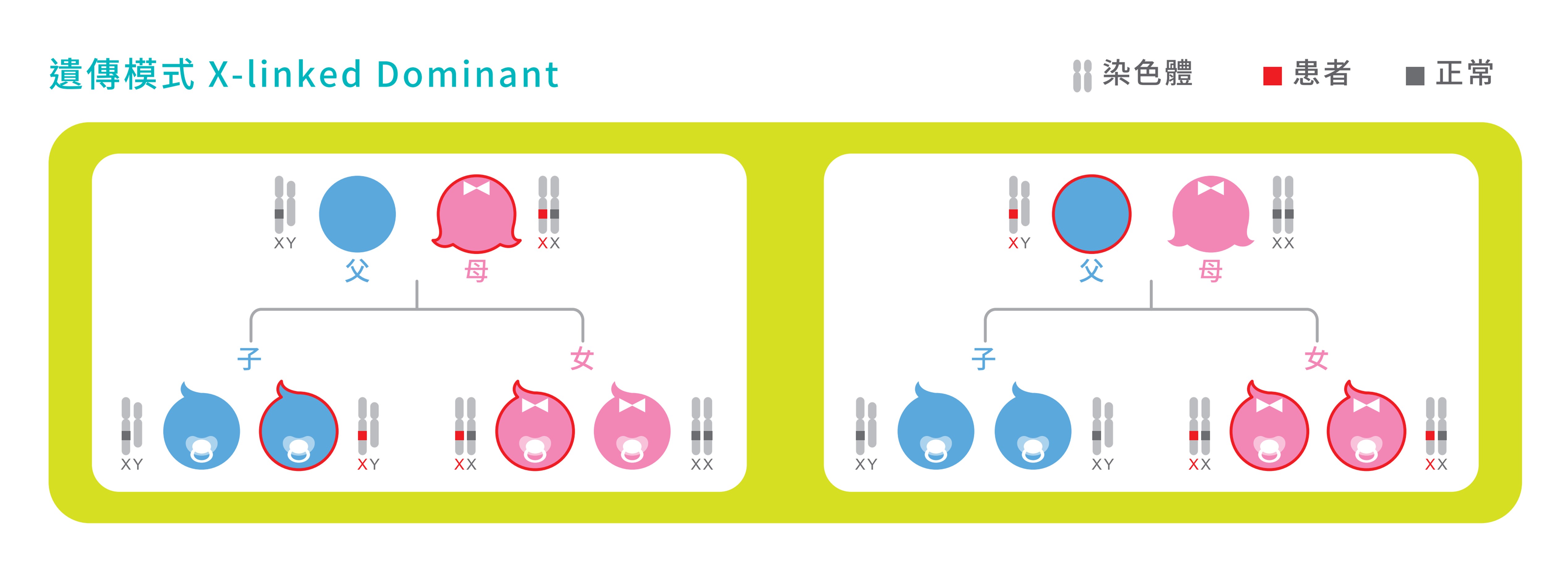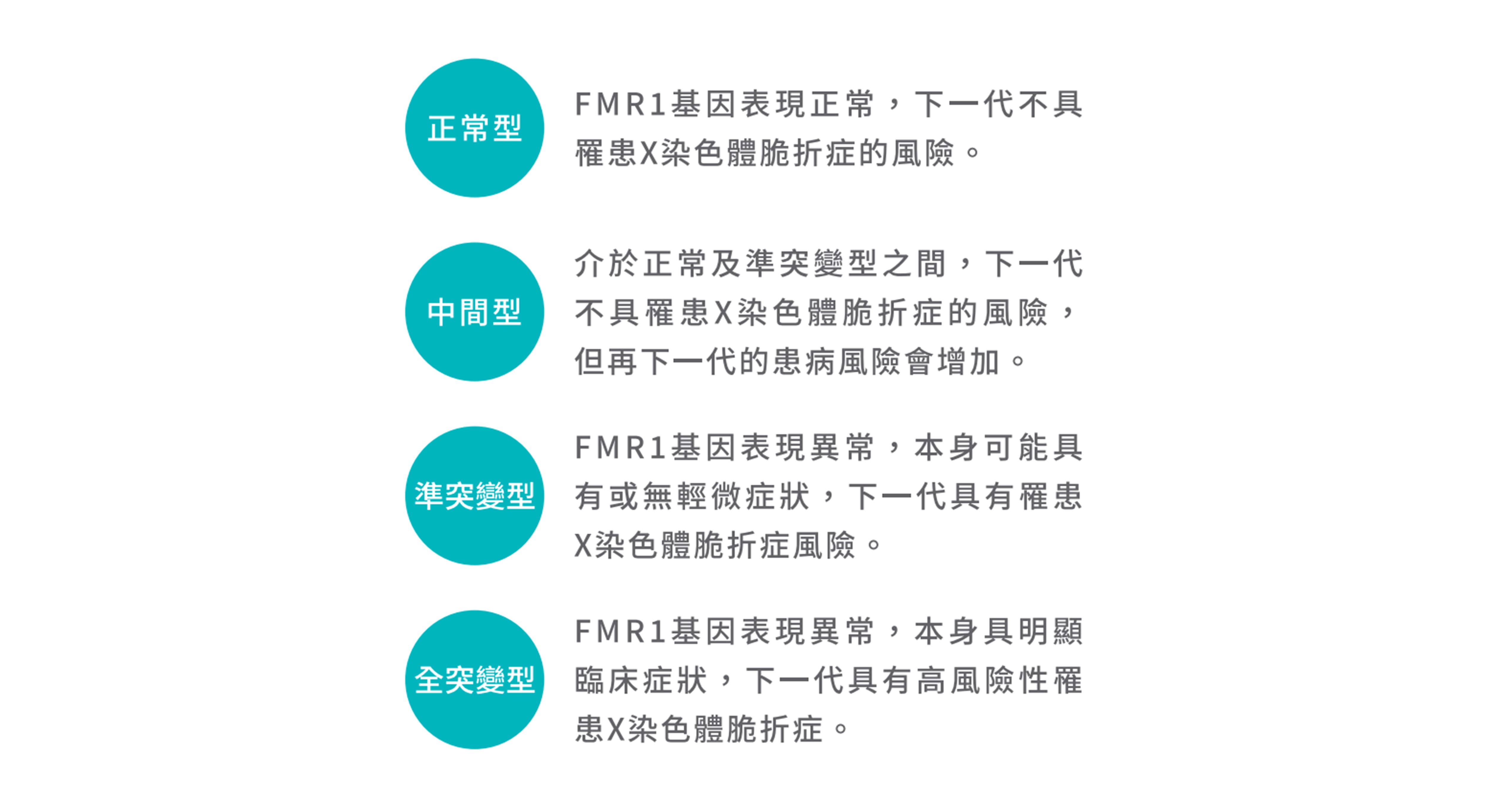X染色體脆折症基因檢測-FMR1基因 (FXS)
服務介紹
X染色體脆折症會導致智能發展障礙,發生率僅次於唐氏症,但和唐氏症最大的不同,是X染色體脆折症會遺傳給後代。 慧智基因提供《X染色體脆折症基因篩檢》,可知道孕婦是否為帶因者,以及早進行羊水檢測。
■ X染色體脆折症
X染色體脆折症是常見的遺傳性智能障礙疾病,疾病發生率男生為1/3,600,女生為1/4,000-6,000,而約1/250的女性為準突變患者。致病原因是因為X 染色體q27.3上FMR1 基因之CGG三核苷酸重複序列不正常擴增所導致,當CGG三核苷酸重複次數大於200次以上,則會造成FMR1基因高度甲基化,使得基因靜默,無法製造產生FMRP蛋白,此蛋白為RNA結合蛋白,可參與其他基因的表現,主要與影響神經細胞的發育有關, 若缺乏FMRP蛋白,則會影響腦部神經細胞發育進一步影響神經細胞彼此之間的連結,而造成X染色體脆折症等症狀發生。

■ 遺傳模式
X染色體脆折症遺傳模式為X連鎖顯性遺傳(X-linked dominant inheritance),性染色體的表現,女生為XX,男生為XY,若1條X染色體發生基因變異,則女性仍會有另1條正常X染色體表現,所以疾病的臨床症狀可能無或較輕微表徵, 男生則因只有1條X染色體, 若基因發生變異,臨床症狀皆較為明顯及嚴重,這也是女性帶因率高的原因,因此建議女性可於產前進行FMR1基因檢測,了解FMR1基因型,以利進一步的遺傳諮詢。
X連鎖顯性遺傳基因變異遺傳至下一代的比例可分成以下兩種狀況:



■ 臨床症狀
✔ 全突變患者
患者新生兒時的生長正常但頭圍大(約>50百分比)且有低張力、反覆性的中耳炎及胃逆流的情況;到了學齡前,臉型瘦長、耳朵寬大、牙齒扁平、下巴突出、動作及語言發展遲緩、特殊特質(過動、拍手、咬手、易怒及自閉)的症狀出現,患者有輕到重度的智能障礙;青
春期後,患者的特殊行為表現更為明顯,如:言詞反覆、視線接觸少、情緒控制問題、注意力不集中、害羞等。而巨睪丸症亦於青春期後出現, 其他症狀包含: 斜視、關節的過度伸展、扁平足、僧帽瓣脫垂、皮膚較光滑等。女性患者症狀通常較少,程度亦較輕。有些生理特徵可單獨發生,不一定有學習及行為障礙。
✔ 準突變患者
有些患者有輕度學習障礙,他們智力正常但在某些部分例如數學或閱讀有困難需要協助。約22%女性患者會出現X染色體脆折症原發性卵巢機能不全症造成賀爾蒙缺乏或不孕情形。約有45%的男女患者在年老時有X染色體脆折症運動失調症候群其症狀包括: 激動、躁動、運動失調、認知下降、短期記憶力喪失、腦部萎縮等。
檢測說明
■ X染色體脆折症基因分型可分四型:


適用對象
✔ 具有X染色體脆折症家族史之夫妻
✔ 具有智能障礙、生長遲滯或自閉症家族之夫妻
✔ 有提早停經、濾泡刺激素(FSH)偏高或卵巢早衰(Premature Ovarian Failure, POF)等不孕症家族史之夫妻
✔ 有成年後運動失調或震顫家族史之夫妻
檢測流程

